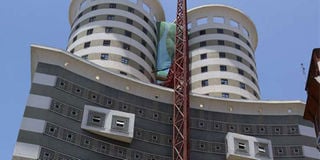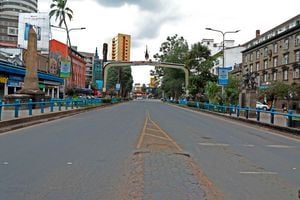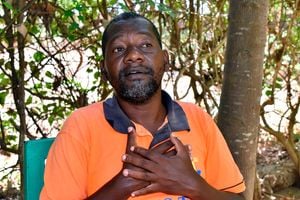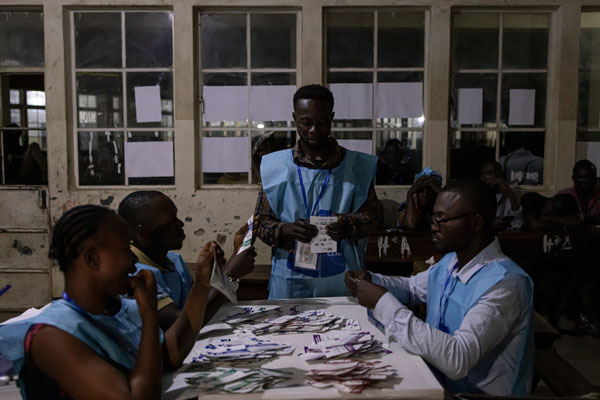
The Nation Centre building on Kimathi Street. Bloggers launched an unprecedented attack on the media, including the Nation Media Group, earlier this week.
Government, using bloggers, launched an unprecedented attack against the media earlier in the week which took me aback for three reasons. The media had carried generally negative but accurate stories of public interest.
One was about failure to issue identity cards, which is a crisis for most people because without an ID, you can’t transact. But it was hardly crisis-level reporting; it was good public interest journalism.
What struck me was the pettiness of the reaction. Vicious bloggers were set loose and hashtags were fired and soon various media were trending. If media are going to face such retaliation for mundane and routine stories like those, what will happen if they report something Anglo Leasing-sized big? What will be the reaction then?
I think that the people in government should make an effort not to take everything personally. If there is a breakdown somewhere, somebody is of course responsible, but being blamed for it does not mean you are being disinherited or some other big consequence. It means you need to step forward, explain, apologise, go back and try harder.
Secondly, this was criminal disinformation: the publication of false material intended to create public panic with the possibility of leading to a breakdown of law and order. One entity, identifying as Queen of the South (@_Achieng) posted on X: “Nation Media Group’s biased reporting undermines public trust in the media. NMG Cancer Ink KEBS Public Alert”. Claims of a non-existent public health emergency and impersonating the national public health watchdog, in my opinion, goes beyond a simple social media spat. This, in my opinion, is criminal conduct, responding to relatively routine reporting.
Thirdly is the sheer lack of depth, intelligence and learning in this whole Nyegeze-level attempt at psyops is just annoying. There is a world of difference between an attempt to control the media, which is the Ceausescu, nail-extracting approach being tried here and will not work, and exercising media influence, which is legitimate and fair game but requires a certain amount of brains.
I have seen in the past when the national interest is at stake, the government would call a meeting of editors, typically early in the morning and say: Look, we are going to have this meeting on a deep background basis. You can’t report anything we say here today, but we want to give you information which will help you to understand what we are about to do and why we are doing it.
Background briefings are routine. As matter of fact, in some developed countries, senior reporters and anchors get security clearance to receive classified briefings. This requires a very high level of professionalism on the part of the reporter to always remember that their job is to report in the public interest and to embarrass government, not to protect it; that the fidelity of journalism is to the country, not to governments. It also requires confident government people.
Before 2013, Kenya had one of the most vibrant and successful media on the continent. That explains, in great part, why the country has such a comparatively highly developed human resource and also a democratic system that is organic: one that rises from the will of the people rather than being gifted from a ruling class or the military. A free, independent and professional press is a classroom; it facilitates the free flow of good quality information in society – science, style, cosmology, agriculture, medicine, wellness, name it, it all flows through the media, whether traditional or new, to the public. It creates an enlightened society that has a thirst for advancement and curiosity to know more.
The media have two sides: they give bad publicity to tin gods and criminals in office (that is the smaller part) and they create a society of informed, smart people (and this is the bigger part). I am saying I don’t know how we can have a conversation with individuals who only see the former and totally lose sight of the latter. I have said this many times and I am going to say it again. In 2013, the destruction of the Kenyan press by bankrupting it became government policy. It is a shallow, uninformed approach to government and undermines one of the objectives of modern government: the creation of open, free societies governed by the rule of law and attractive to foreign investment and tourism.
My final point: investors used to come here because they could get information about the country – including its problems – from a relatively free press. By following coverage, they would feel confident that they knew the country relatively well. Secondly, they would invest here because the country had a free press.
A country with a free press is attractive because it is an indicator of accountability, the rule of law, an obedience to rules and standards, moderation and respect for rights. If, as I suspect, taxpayer cash is used to loose bloggers on the media to perpetrate criminal disinformation, then the people doing that are not helping. They are sticking a rifle into the mouth of whatever they claim to be trying to achieve – and pulling the trigger.
Step back, reflect, change course.












